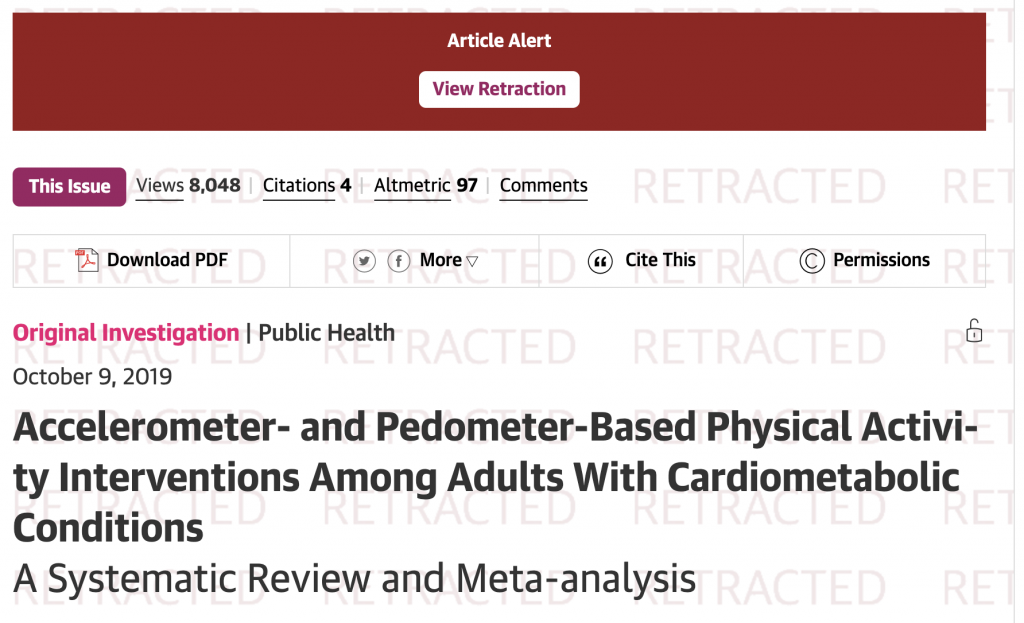
The authors of a 2019 meta-analysis in a JAMA journal on exercise and heart disease have retracted the paper after discovering that a quarter of the studies they’d used in the analysis did not belong.
The retraction is the first for the journal, which had published some 2,800 articles before having to pull one, Frederick P. Rivara, the editor in chief, told Retraction Watch. One in 2,800, we should note, is quite close to the 4 in 10,000 rate of retraction in the overall literature.
The study, from a group at the Universities of Manchester and Brighton, in the United Kingdom, was titled “Accelerometer- and pedometer-based physical activity interventions among adults with cardiometabolic conditions: a systematic review and meta-analysis,” and appeared in JAMA Network Open.
The authors, led by Alexander Hodkinson, looked at 36 randomized clinical trials and found that:
accelerometer- and pedometer-based interventions were associated with small to medium short-term improvements in physical activity and that consultations with health professionals and pedometers were associated with improved physical activity. …
But last month, the group walked back that finding after identifying a major error in their article, which was cited four times, according to Clarivate Analytics’ Web of Science. Per the retraction notice:
We write to report a decision to retract the article “Accelerometer- and Pedometer-Based Physical Activity Interventions Among Adults With Cardiometabolic Conditions: A Systematic Review and Meta-analysis,”1 published in JAMA Network Open on October 9, 2019, based on our mistake in applying the intervention definition, which has affected the inclusion criteria for 9 of the 36 studies included in this systematic review and meta-analysis.
…. As we reported in the article, “Randomized clinical trials or cluster randomized clinical trials evaluating the use of wearable technology devices such as pedometers and accelerometers as motivating and monitoring tools for increasing PA were included.” In our systematic review, searches retrieved 5762 references, and following abstract and title screening of 1439 references and full-text screening of 107 studies, we reported that 36 randomized trials, comprising 5208 patients, met our inclusion criteria. However, as we reported in our PROSPERO registered protocol, “Step counters, accelerometers and pedometers used for monitoring walking speed (for example, steps per minute) or solely for assessing the effects of a lifestyle program on physical activity will be excluded.”2
This was a complex scenario in which these devices had to be used as motivating tools within the intervention arms as well as monitoring tools for the primary outcome (PA) in both arms of trials to be eligible for this analysis. In 9 of these trials,3–11 comprising 2911 patients, devices were only used as monitoring tools of PA in both arms and were not randomly assigned within the intervention arm as a motivating tool for physical activity, and these trials should not have been included in the analysis.
Thus, at the request of the editors, we are retracting our article. We apologize for this error. We aim to reconduct this meta-analysis without the data from these 9 trials and will prepare a new manuscript for consideration.
Hodkinson has not responded to a request for comment.
Like Retraction Watch? You can make a tax-deductible contribution to support our work, follow us on Twitter, like us on Facebook, add us to your RSS reader, or subscribe to our daily digest. If you find a retraction that’s not in our database, you can let us know here. For comments or feedback, email us at [email protected].